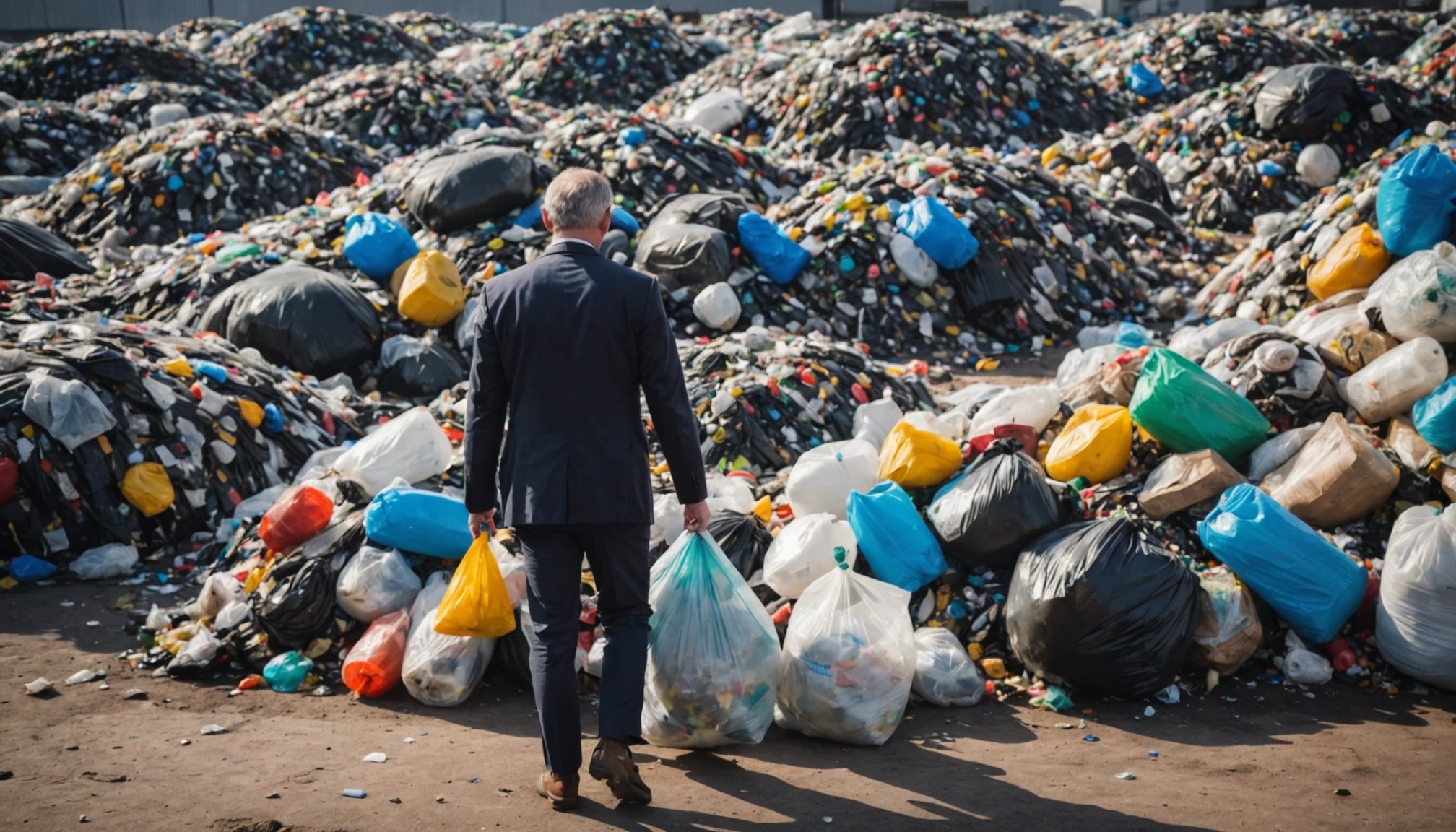Creating a UK Social Enterprise to Combat Plastic Waste: A Comprehensive Guide
Understanding the Problem: The Impact of Plastic Waste
Before diving into the steps to create a social enterprise aimed at combating plastic waste, it’s crucial to understand the magnitude of the problem. Plastic pollution is one of the most pressing environmental issues of our time, affecting not only the environment but also human health and the economy.
Plastic waste, particularly single-use plastics such as plastic bags, straws, and packaging, contributes significantly to the pollution of our oceans, rivers, and landscapes. According to various reports, millions of tonnes of plastic waste end up in the environment each year, harming wildlife and contaminating the food chain[4].
Topic to read : Ultimate handbook for complying with uk fire safety regulations in your new shared office environment
Setting Up Your Social Enterprise
Mission and Vision
The foundation of any successful social enterprise is a clear mission and vision. When it comes to combating plastic waste, your mission should be focused on reducing plastic pollution, promoting sustainable practices, and educating the public about the environmental impact of plastic use.
Example Mission Statement:
“Our mission is to reduce plastic waste in the UK by promoting sustainable practices, educating the public, and supporting innovative recycling solutions, ultimately contributing to a cleaner and healthier environment.”
In parallel : Launching your eco-tourism venture in the uk: a comprehensive guide to navigating conservation regulations
Legal Structure
Choosing the right legal structure for your social enterprise is vital. In the UK, common options include Community Interest Companies (CICs), Charitable Incorporated Organisations (CIOs), and Social Enterprises Limited by Guarantee.
Table: Comparing Legal Structures for Social Enterprises in the UK
| Legal Structure | Description | Advantages | Disadvantages |
|---|---|---|---|
| Community Interest Company (CIC) | A company that exists to benefit the community rather than private shareholders. | Can raise capital, flexible governance, clear social mission. | Must pass the ‘community benefit test’, annual reporting requirements. |
| Charitable Incorporated Organisation (CIO) | A charity that is incorporated and so has its own legal identity. | Tax benefits, public trust, clear charitable mission. | Strict governance and reporting requirements, limited ability to raise capital. |
| Social Enterprise Limited by Guarantee | A company where members guarantee a fixed amount if the company is wound up. | Flexible governance, clear social mission, limited liability. | No tax benefits, annual reporting requirements. |
Funding and Financial Support
Securing funding is a critical step in establishing and growing your social enterprise. Here are some potential sources of funding:
- Grants: Apply for grants from environmental and social impact-focused foundations.
- Crowdfunding: Platforms like Kickstarter and GoFundMe can help raise initial capital.
- Corporate Partnerships: Collaborate with businesses committed to sustainability.
- Government Initiatives: Utilize government programs and incentives for social enterprises.
Quote from Bénédicte Garbil, Senior Vice President of Corporate Affairs and Sustainability at Carbios:
“We need to make sure [our technology] is accessible in as many regions as possible. This requires significant funding and partnerships with various stakeholders”[2].
Developing Your Strategy
Reducing Plastic Use
One of the primary strategies for combating plastic waste is to reduce the use of plastics, especially single-use plastics.
- Promote Alternatives: Encourage the use of eco-friendly materials like paper packaging, bamboo straws, and cloth bags.
- Educate Consumers: Run campaigns and workshops to educate the public about the environmental impact of plastic use.
- Collaborate with Businesses: Work with businesses to adopt sustainable packaging solutions and reduce plastic use in their supply chains.
Example Initiative:
“Carbios’s biological recycling process can handle non-recyclable plastics, providing a innovative solution to traditional mechanical recycling limitations”[2].
Improving Waste Management
Effective waste management is crucial for reducing plastic pollution.
- Recycling Programs: Implement and promote recycling programs, including curbside recycling and public recycling bins.
- Composting: Support composting initiatives for biodegradable materials.
- Clean-Up Efforts: Organize community clean-up events and support initiatives like the Plastic Odyssey, which focuses on removing plastic waste from highly polluted areas[5].
Quote from Simon Bernard, CEO and Co-founder of Plastic Odyssey:
“We document small, locally-designed solutions that no one has heard of or talked about, in a sort of Wikipedia of all the knowledge on plastic recycling”[5].
Promoting Recycling and Circular Economy
Recycling and adopting a circular economy model are key to reducing plastic waste.
- Innovative Recycling Solutions: Support and promote innovative recycling technologies like Carbios’s ‘plastic-eating’ enzyme.
- Circular Supply Chains: Encourage businesses to adopt circular supply chains where materials are continuously cycled back into production.
- Education and Training: Provide education and training programs for local communities on plastic recycling and sustainable practices[5].
Example of Circular Economy in Action:
“WRAP and Primark are working together to give clothes a longer life, exploring how collaboration and innovative solutions can keep clothing in circulation for longer to reduce textile waste”[3].
Building Partnerships and Collaborations
Collaboration is essential for the success of any social enterprise, especially one focused on environmental issues.
Partnerships with Businesses
- Industry Collaborations: Work with businesses to implement sustainable practices and reduce plastic use in their operations.
- Supply Chain Management: Collaborate with suppliers to ensure sustainable sourcing of materials.
- Innovative Solutions: Partner with companies like Carbios to implement new recycling technologies.
Quote from Catherine David, Director of Behaviour Change & Business Programmes at WRAP:
“We are working in new ways with businesses like Primark, and across the world, to accelerate progress towards our goal of cutting the carbon footprint of the textiles industry in half by 2030″[3].
Community Engagement
- Public Awareness Campaigns: Run campaigns to raise public awareness about the impact of plastic waste.
- Community Events: Organize community events, workshops, and clean-up initiatives to engage the public.
- Education Programs: Develop education programs for schools and local communities to promote sustainable practices.
Example Initiative:
“Plastic Odyssey’s mission includes promoting sustainable practices and educating local communities on plastic pollution and recycling through webinars and workshops”[5].
Measuring Impact and Sustainability
To ensure the long-term success and sustainability of your social enterprise, it’s crucial to measure its impact.
Key Performance Indicators (KPIs)
- Reduction in Plastic Waste: Track the amount of plastic waste reduced through your initiatives.
- Recycling Rates: Monitor the increase in recycling rates in the areas you operate.
- Public Engagement: Measure the number of people engaged through your campaigns and events.
- Economic Impact: Assess the economic benefits of your initiatives, such as job creation and cost savings.
Table: Example KPIs for a Social Enterprise Combating Plastic Waste
| KPI | Description | Target |
|---|---|---|
| Reduction in Plastic Waste | Tonnes of plastic waste reduced annually. | Reduce plastic waste by 10% annually. |
| Recycling Rates | Percentage increase in recycling rates. | Increase recycling rates by 20% within the first two years. |
| Public Engagement | Number of people engaged through campaigns and events. | Engage 10,000 people in the first year. |
| Economic Impact | Number of jobs created and cost savings achieved. | Create 50 jobs and achieve £100,000 in cost savings annually. |
Practical Insights and Actionable Advice
Behaviour Change
Encouraging behaviour change is a critical aspect of reducing plastic waste.
- Educate and Inform: Provide clear, concise information about the impact of plastic use.
- Make it Easy: Ensure that sustainable alternatives are easily accessible and convenient.
- Lead by Example: Demonstrate sustainable practices within your own organization.
Quote from Jen Keane, Co-founder and CEO of Carbios:
“We need to build within the existing infrastructure as much as possible. So, we’ve been designing our manufacturing process so that it can work with existing machinery, and partnering to look at how we can scale without having to do everything from scratch”[2].
Leveraging Technology
Technology can play a significant role in combating plastic waste.
- Innovative Recycling Technologies: Adopt and promote new recycling technologies like biological recycling.
- Digital Platforms: Use digital platforms to educate, engage, and monitor public participation in sustainable practices.
- Data Analytics: Utilize data analytics to track and measure the impact of your initiatives.
Example of Technological Innovation:
“Carbios’s biological process can handle non-recyclable plastics, providing a solution to traditional mechanical recycling limitations”[2].
Creating a social enterprise aimed at combating plastic waste is a challenging but rewarding endeavor. By setting a clear mission, developing a robust strategy, building strong partnerships, and measuring impact, you can make a significant difference in reducing plastic pollution.
Remember, every small step counts, and collective action can lead to substantial change. As Simon Bernard from Plastic Odyssey aptly puts it, “Nothing is impossible” when it comes to tackling the global plastic crisis.
Final Thoughts:
- Stay Informed: Keep up-to-date with the latest research, technologies, and policies related to plastic waste.
- Collaborate: Work with various stakeholders, including businesses, governments, and local communities.
- Educate: Continuously educate and inform the public about the impact of plastic waste and the benefits of sustainable practices.
Together, we can create a more sustainable future and reduce the devastating impact of plastic pollution on our environment.
Funding Opportunities for Social Enterprises
In the dynamic landscape of social enterprises, acquiring suitable funding is crucial to achieving both social and financial objectives. This involves a variety of opportunities, including traditional and innovative funding sources. Funding sources offer multiple avenues from which social enterprises can benefit.
Primarily, grants are valuable for those focusing on environmental initiatives. Numerous organisations, both governmental and non-governmental, provide targeted financial support to projects that contribute to sustainability and ecological preservation. These grants not only provide no-strings-attached capital but also enhance credibility and visibility.
Investment options, such as impact investment, focus on businesses generating measurable social and environmental impact alongside financial returns. Investors keen on supporting meaningful change are increasingly turning to social enterprises, making this an appealing avenue for funding. The dual focus on financial performance and positive societal contributions attracts both altruistic and return-seeking investors.
Crowdfunding platforms represent another innovative solution for raising capital. By harnessing the power of the crowd, social enterprises can secure funds from individuals inspired by their mission. These platforms offer a democratic approach to funding, enabling enterprises to connect with a global audience that values their cause. Each method comes with its specific requirements and conditions, allowing social enterprises to select the most suitable sources based on their missions and goals.
Building Partnerships and Collaborations
The fight against plastic waste is a global challenge that requires concerted efforts and strong partnerships. Engaging stakeholders such as businesses, governmental bodies, and non-profits is crucial. By forming effective collaborations, we can amplify our impact and drive meaningful change. One powerful strategy is community engagement. By involving local communities, we ensure that initiatives are grounded in real-world needs and are more likely to succeed.
To foster these partnerships, transparency and open communication are key. Regular forums and workshops allow stakeholders to exchange ideas and devise innovative solutions to combat plastic waste. Furthermore, identifying shared objectives can unify diverse groups, encouraging them to work towards a common goal.
Effective examples of such collaborations include public-private partnerships. For instance, some cities partner with environmental NGOs to enhance recycling programs, thus reducing landfill dependency. Another notable example is collaborations between tech firms and environmental consultancies, using data analytics to track and reduce plastic footprints.
In essence, these partnerships and collaborations harness collective strengths, increasing the reach and efficiency of initiatives aimed at plastic waste reduction. Harnessing diverse perspectives and expertise not only accelerates progress but also ensures that the solutions developed are holistic and sustainable. By building robust networks, we can create a formidable front against the challenges of plastic waste.
Operational Strategies for Effective Implementation
Formulating diverse operational strategies is crucial for fostering sustainability practices. To facilitate this, organizations are advised to draft detailed plans highlighting sustainability as a core objective. Developing these strategies involves integrating environmentally friendly practices into daily operations, which goes beyond mere compliance to environmental regulations.
One essential aspect of these strategies is the sourcing of materials. It entails selecting suppliers and materials that support sustainability goals, ensuring products are eco-friendly from the onset. Sustainable logistics management is equally vital. Companies should aim to optimize supply chains, considering both environmental impact and cost efficiency issues. Efficient logistics minimize unnecessary transportation, hence reducing emissions and energy consumption.
The effectiveness of these initiatives is evaluated through carefully chosen metrics. Measuring impact is indispensable to ensure consistency in efforts against plastic waste and other environmental challenges. Companies must track their performance through both qualitative and quantitative data, which involves assessing reductions in waste and emissions comprehensively. These evaluations can enhance decision-making processes in refining strategies for future sustainability projects.
Organizations that emphasize these strategies not only contribute positively to environmental conservation but can also gain significant competitive advantages. These strategies forge a pathway for effective integration of sustainability into operational frameworks, ultimately benefiting both the environment and business.
Case Studies of Successful UK Social Enterprises
Highlighting success stories provides insights into how social enterprises can effectively tackle plastic waste in the UK. These case studies not only showcase innovative approaches but also offer lessons learned that can inspire future social entrepreneurs.
One notable example is the social enterprise “Plastic Solutions,” which has developed a community-driven recycling program. This initiative emphasizes the importance of local community engagement, leading to substantial reductions in local plastic waste. By educating and involving residents, Plastic Solutions has managed to create sustainable change and increase awareness about environmental impact.
Another inspiring success story is “Eco-Innovators,” which focuses on creating products from recycled plastic. Their model not only minimizes waste but also offers economic opportunities by selling these products. Through collaboration with local businesses and artisans, Eco-Innovators have demonstrated that recycling can be both environmentally and financially beneficial.
From these enterprises, aspiring social entrepreneurs can draw valuable lessons:
- Community engagement can amplify impact and foster sustainable practices.
- Innovative use of recycled materials can lead to economic opportunities.
- Establishing partnerships is essential in scaling efforts and maximizing resource use.
By learning from these case studies, new social entrepreneurs can better navigate challenges and drive meaningful change in their own communities.
Navigating Challenges in Combating Plastic Waste
Addressing the surge of plastic waste presents distinct challenges for social enterprises striving for environmental change. These ventures often encounter regulatory, financial, and operational hurdles, each requiring tailored strategies to mitigate and overcome their impact effectively.
The regulatory challenges begin with understanding and complying with a multitude of environmental policies – a daunting task for any social entrepreneur. Often, these policies vary greatly across regions, demanding a robust strategy that balances compliance with innovative practices. Social enterprises can leverage synergies by collaborating with policymakers to advocate for supportive legislation.
Financial challenges are prevalent. Many social enterprises operate with limited budgets, necessitating creative financing solutions. Grants, philanthropic donations, and impact investors serve as essential lifelines. Diversifying funding sources and demonstrating measurable social impact can also boost investor confidence.
Operational difficulties often arise from the need to scale efficiently. Embracing technology and innovative methods can streamline processes and optimise resources. Meanwhile, engaging community support through education is instrumental in success. Creating awareness and showcasing the tangible benefits of their programmes helps garner local support and participation.
Ultimately, social entrepreneurship thrives on flexibility and resilience. Through continued learning, and strategic collaborations, these ventures can navigate the intricate landscape of plastic waste reduction, empowering communities to safeguard their environment while fostering sustainable growth.
Resources and Support Networks
Starting a social entrepreneurship endeavour can be a rewarding yet challenging journey. Identifying the right resources and support networks is essential. There are several key resources dedicated to assisting startups with a social mission. Incubators and accelerators like the Skoll Centre for Social Entrepreneurship and Acumen Fund provide mentorship, funding, and strategic advice specifically tailored for social enterprises.
Engaging with support networks can significantly boost a social startup’s chances of success. Organizations such as Ashoka and the Social Enterprise Alliance offer opportunities to connect with like-minded entrepreneurs, access valuable insights, and collaborate on impactful initiatives. Joining such networks not only enhances knowledge but also fosters a supportive community, which is invaluable for facing industry challenges.
Staying informed about industry trends and best practices requires using the right tools and platforms. Social entrepreneurs can benefit from platforms such as NextBillion, which provides up-to-date articles and research on social entrepreneurship. Additionally, leveraging digital tools like webinars and podcasts can offer continuous learning opportunities and exposure to innovative ideas.
By fully utilizing these resources, tools, and support networks, entrepreneurs can navigate the complexities of social entrepreneurship more effectively, ensuring their enterprises are not only sustainable but truly impactful.











